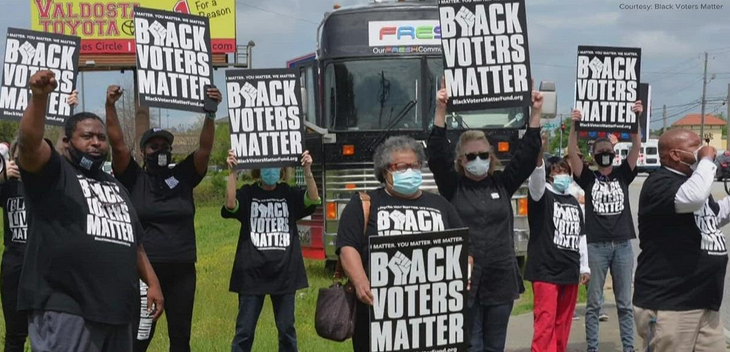By Dr. Tom H. Hastings\PeaceVoice
Photos: Black Voters Matter\YouTube Screenshots
When I was in prison for my nonviolent anti-nuclear actions, one of my disciplines was to write something for publication daily–a letter to the editor, an opinion piece, a book review, or even mediocre poetry. One hundred percent of my writing was in opposition to nuclear weapons.

I couldn’t vote while I was incarcerated. But I refused to stop participating in our democracy. If I could convince even two people to care enough to vote who had not been voting even though they were able to, and if they voted for a candidate who was opposed to nuclear weapons, I felt like this was how I was still part of the democracy of my country.
Who are the people who cannot vote and who are yet a part of how our democracy functions? An incomplete list, but one that I hope gives some hope to those who wish they could vote in our American elections:
· Surviving students from the horrific 2018 Valentine’s Day mass shooting at Marjory Stoneman Douglas high school were too young to vote and yet started a movement that built enough pressure on politicians to achieve some legislative victories.
· Greta Thunberg was a young Swedish girl who began the climate strike movement that prompted governments far beyond her own to act. Too young to vote, not a citizen of anyplace except Sweden, and yet she profoundly participates in democracies from the UK to New Zealand to the US and beyond, so influential she was Time magazine’s Person of the Year in 2019.
· In the spring of 1963, more than a thousand young students skipped school in Birmingham, Alabama, to protest segregation and the anti-democratic Jim Crow voter suppression that black people endured in Alabama. They couldn’t vote because they were too young and their parents were routinely stopped from voting because they were black. Yet their campaign, called the Children’s Crusade, was instrumental in inspiring mass support across the US for both the Civil Rights Act of 1964 and the Voting Rights Act of 1965.
· In Liberia, dictator Charles Taylor rigged “elections” and maintained his iron grip on power, so there was no democracy in which to participate during his rule, which featured a particularly brutal 14-year civil war with child soldiers on both sides, rape and massacres. The Liberian women united in nonviolent resistance, rose up and stopped the war and created a new real democracy.
The countless stories of disenfranchised people around the world making a difference in their democracies–or even creating democracy where there had been none–can help motivate us when we feel like it’s hopeless. It is never impossible to participate in democracy. People like Rosa Parks, John Lewis, Alice Paul, and so many more are still influential even though they’ve passed on.
This is your democracy, even if you are 15, even if you are undocumented, even if you are incarcerated. We all own it, we all can make it stronger and more responsive to what we need, to justice, to a world fit for life. Five minutes of action a day by millions of us can be the best protection of our hope, our rights, our freedom from fear, our freedom to love and live.
Democracy is way deeper than one vote every few years. It will live or die, depending on our commitment to it. We are powerful, every one of us.

Dr. Tom H. Hastings, PeaceVoice Senior Editor, is Coördinator of Conflict Resolution BA/BS degree programs and certificates at Portland State University.






